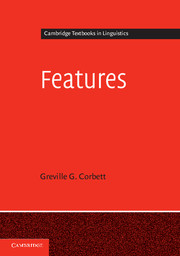Book contents
- Frontmatter
- Contents
- Figures
- Tables
- Preface
- Abbreviations
- 1 Why features?
- 2 Formal perspectives
- 3 Features for different components
- 4 Justifying particular features and their values
- 5 Typology
- 6 Canonical Typology and features
- 7 Determining feature values
- 8 Feature-value mismatches
- 9 Conclusions
- Appendix Standards and implementations
- References
- Author index
- Language index
- Subject index
9 - Conclusions
Published online by Cambridge University Press: 05 November 2012
- Frontmatter
- Contents
- Figures
- Tables
- Preface
- Abbreviations
- 1 Why features?
- 2 Formal perspectives
- 3 Features for different components
- 4 Justifying particular features and their values
- 5 Typology
- 6 Canonical Typology and features
- 7 Determining feature values
- 8 Feature-value mismatches
- 9 Conclusions
- Appendix Standards and implementations
- References
- Author index
- Language index
- Subject index
Summary
We began by trying to write a grammatical description without using features. The account was repetitious, and missed the point. The attempt illustrated vividly why features are central in mainstream linguistics. They have a key place for good reason, and they have important roles in linguistic frameworks which are very different in other respects. But now consider what languages would be like if we genuinely did not need features. If for instance the sound systems of natural languages were not naturally described in terms of a relatively small number of oppositions. Or if there were no features like number, running through the morphosyntax and affecting items of different parts of speech. We would lose much of the intriguing richness of natural languages. If we look at inventories, the five-valued number system of Sursurunga, with its paucal and greater paucal, is impressive. The simple systems of English or Russian are not so obviously challenging, until we look at the nouns involved in the number system and find that the border for number-differentiation is drawn at slightly different points. case in German seems trivial compared with the massive case system of Archi, until we look at the tricky patterns of syncretism in the German system.
If we turn to the way in which features and values are distributed, some languages like Russian look easy at first: verbs mark the person, number and gender of the subject. We then compare with languages like Archi where the rules of agreement are more complex, and moreover many verbs do not agree. There is therefore plenty to be done, for those who care about what the features mean, and for those who are concerned with their distribution, from fieldworkers and typologists through to the computational linguists. More importantly, there are strong reasons for bringing these perspectives together. We need to make reasoned rather than habit-based choices about our use of features as we analyse and enjoy the richness and diversity of the world's languages.
- Type
- Chapter
- Information
- Features , pp. 264Publisher: Cambridge University PressPrint publication year: 2012



